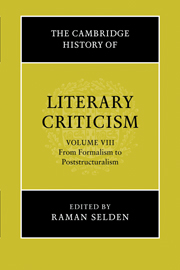Book contents
- Frontmatter
- Introduction
- 1 Russian Formalism
- STRUCTURALISM: ITS RISE, INFLUENCE AND AFTERMATH
- 2 Structuralism of the Prague School
- 3 The linguistic model and its applications
- 4 Semiotics
- 5 Narratology
- 6 Roland Barthes
- 7 Deconstruction
- 8 Structuralist and poststructuralist psychoanalytic and Marxist theories
- READER-ORIENTED THEORIES OF INTERPRETATION
- Bibliography
- Index
- References
6 - Roland Barthes
from STRUCTURALISM: ITS RISE, INFLUENCE AND AFTERMATH
Published online by Cambridge University Press: 28 March 2008
- Frontmatter
- Introduction
- 1 Russian Formalism
- STRUCTURALISM: ITS RISE, INFLUENCE AND AFTERMATH
- 2 Structuralism of the Prague School
- 3 The linguistic model and its applications
- 4 Semiotics
- 5 Narratology
- 6 Roland Barthes
- 7 Deconstruction
- 8 Structuralist and poststructuralist psychoanalytic and Marxist theories
- READER-ORIENTED THEORIES OF INTERPRETATION
- Bibliography
- Index
- References
Summary
Barthes and theory
Ancient rhetoric, which Barthes revived and which has played a major part in recent literary theory, described strategies to propitiate the reader. They are urgently needed when one proposes to write on Barthes. One first needs to explain why a chapter, alone among those which describe whole movements, is devoted to a single individual. One must then point out difficulties arising from the fact that we are dealing here with a very problematic figure. Barthes’ desire to preserve his freedom of direction, especially in mid-career when the theoretical picture became very confused for ideological and political reasons, sometimes generates a textual indeterminacy which calls for interpretive commitment on the part of the critic. Further, Barthes made his name as a critic and theorist of not only literature but society; and although these two activities were soon subsumed by him under the common label of semiology, the general science of signs postulated by the Swiss linguist Saussure at the turn of the century, they remain distinct to some extent. Should Barthes’ work as a ‘sociologist of the qualitative’ be described in a history of criticism? Space forbids it, but reference will be made to overlapping concepts and themes. Furthermore, although one expects that an individual thus singled out has some wider social significance, should this be a chapter on Barthes, or only on Barthesianism? The term arose because the doctrines which have influenced two generations of literary theorists were clearly articulated by him, and propagated with the utmost polemical resourcefulness even when, in the latter part of his career, he yearned to see desire replace domination, putting an end to the ‘war of languages’.
- Type
- Chapter
- Information
- The Cambridge History of Literary Criticism , pp. 131 - 165Publisher: Cambridge University PressPrint publication year: 1995

